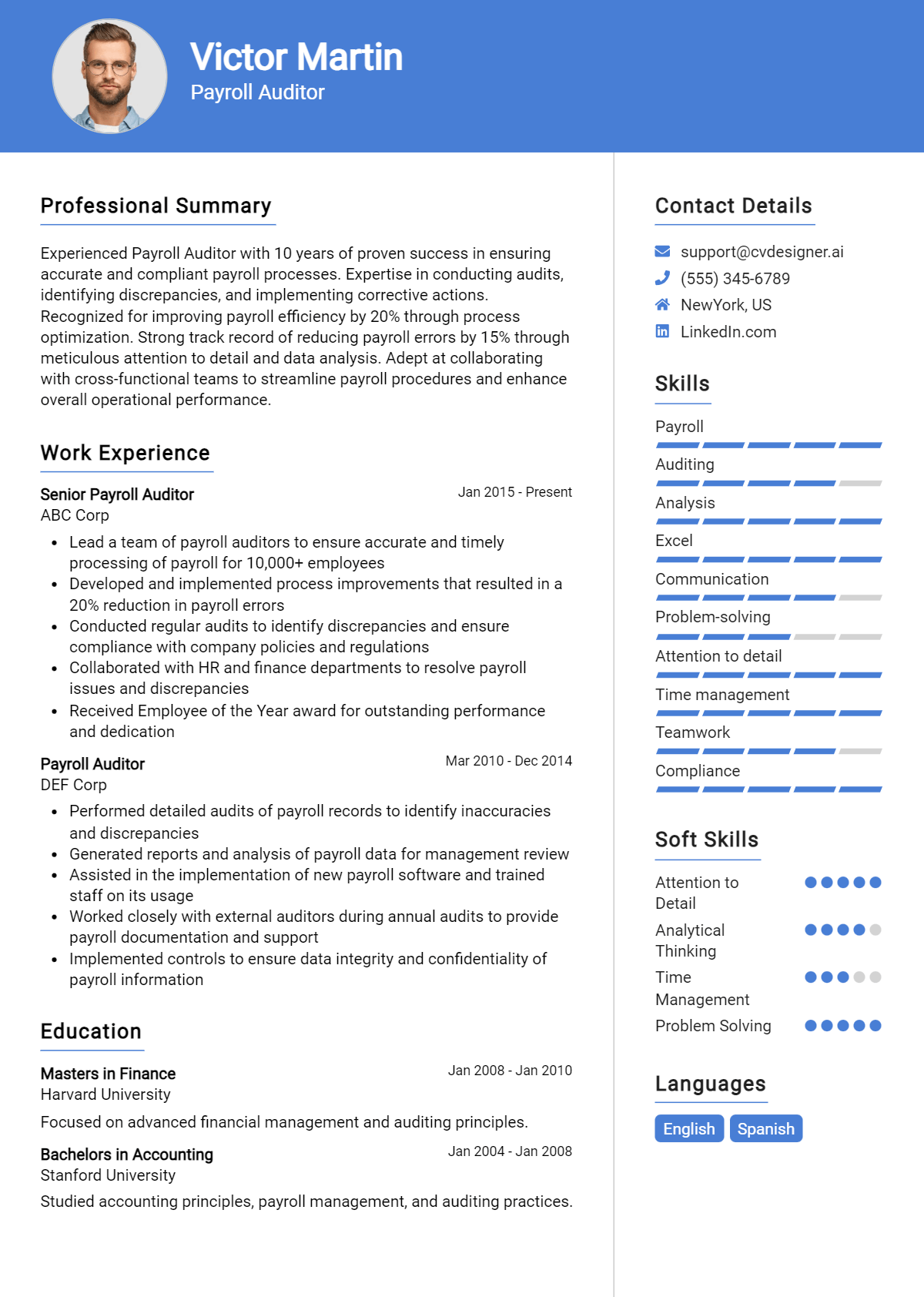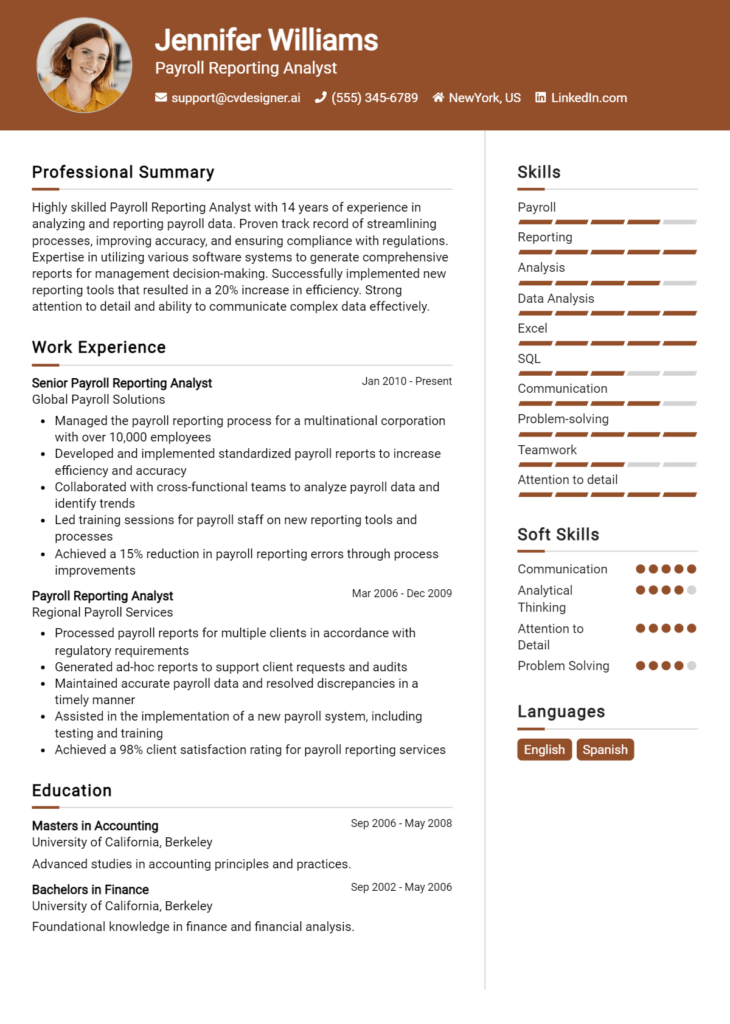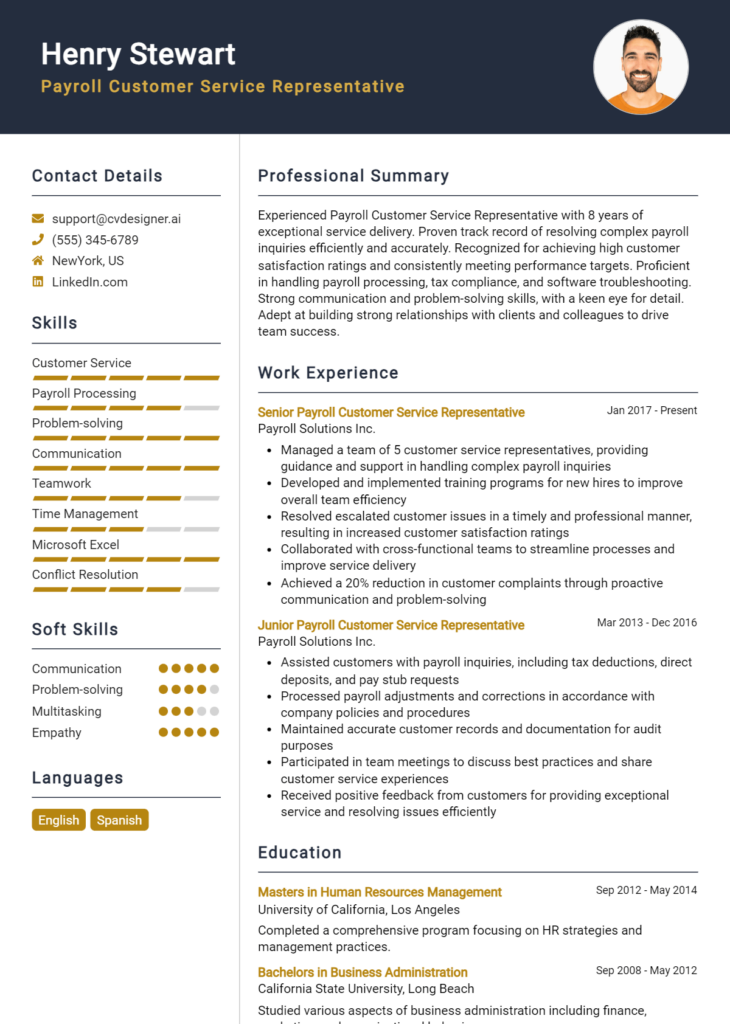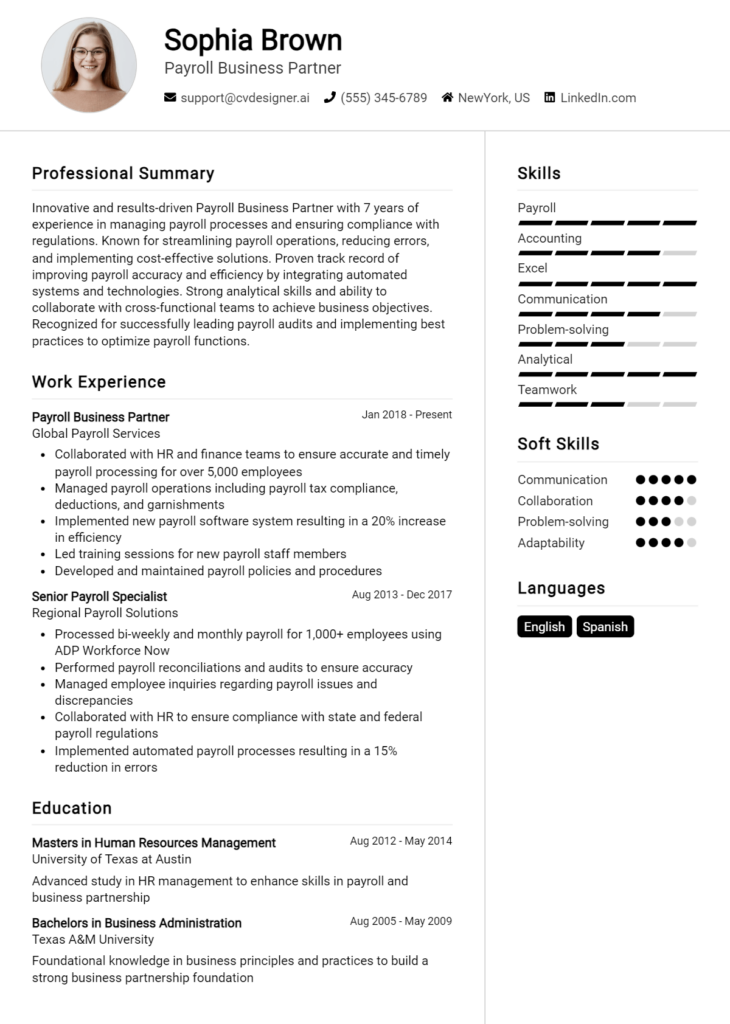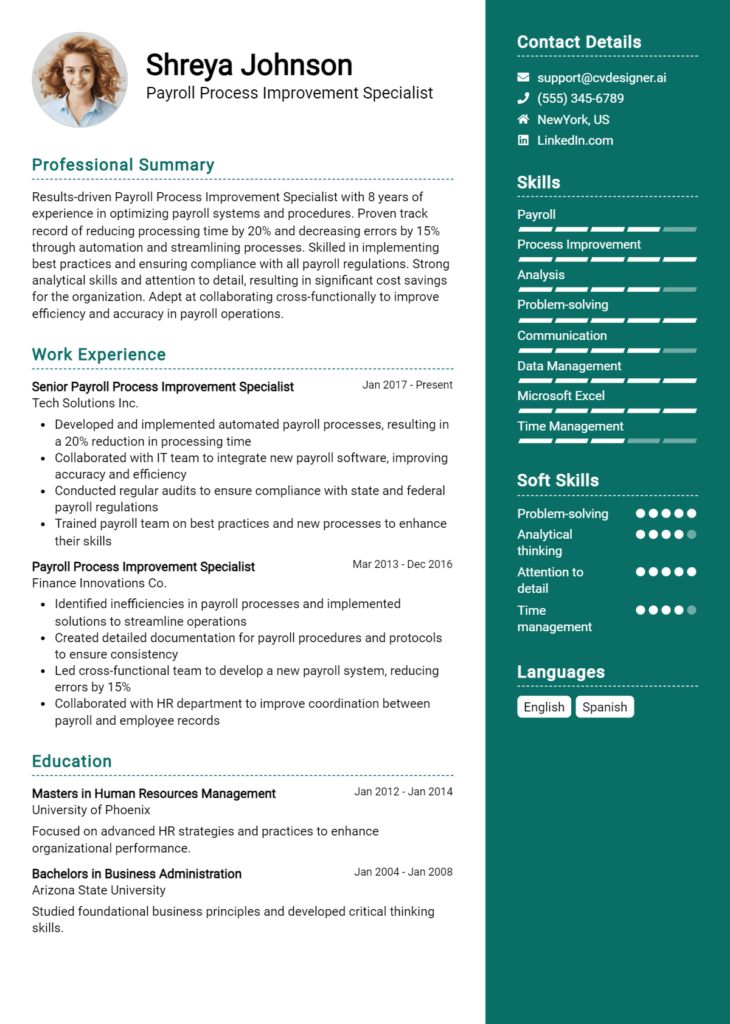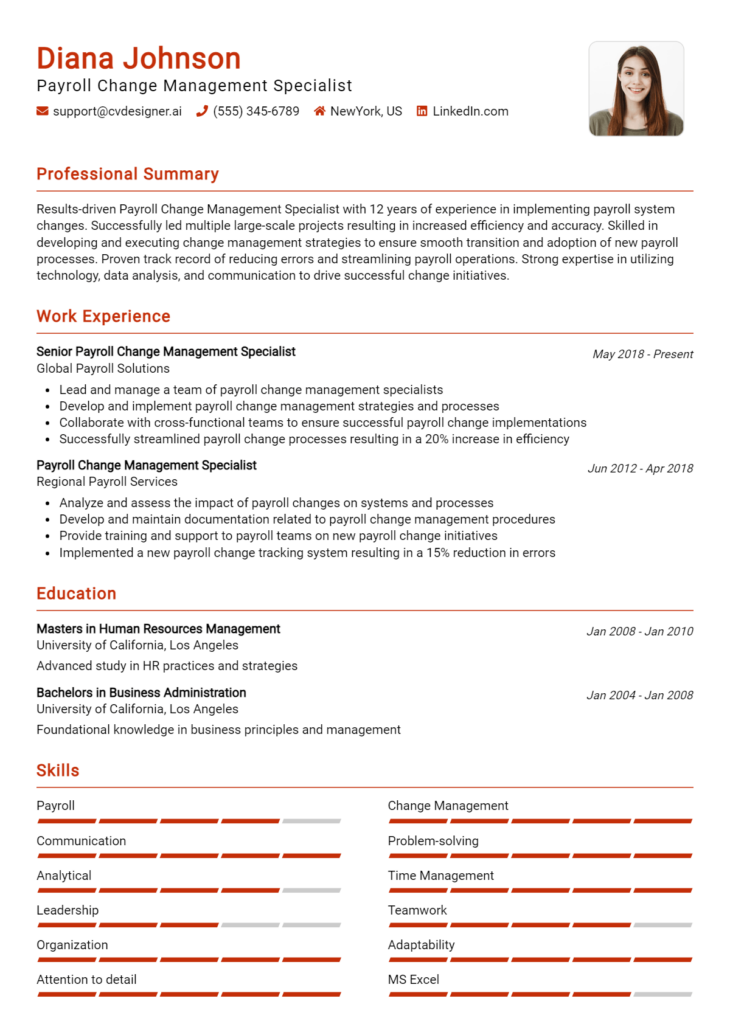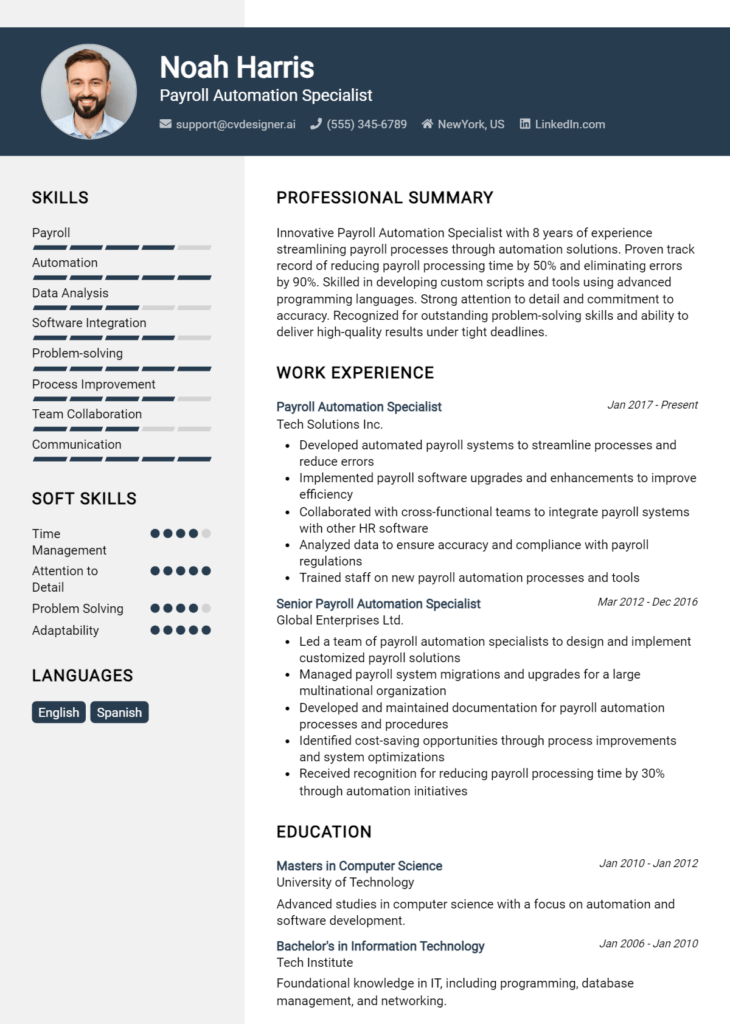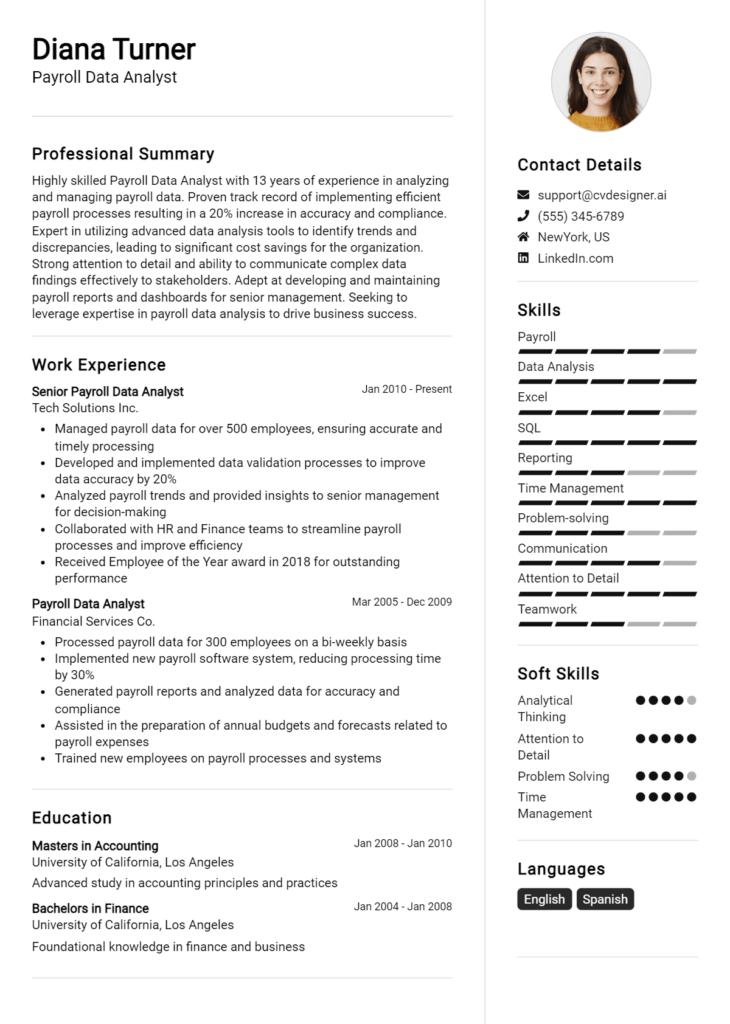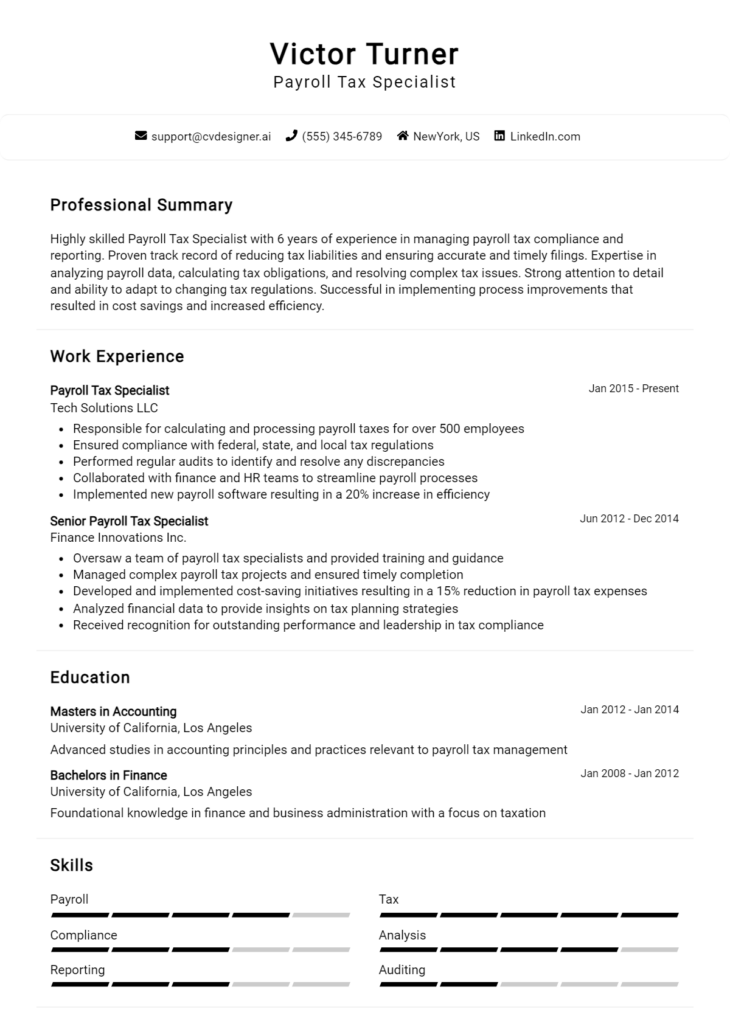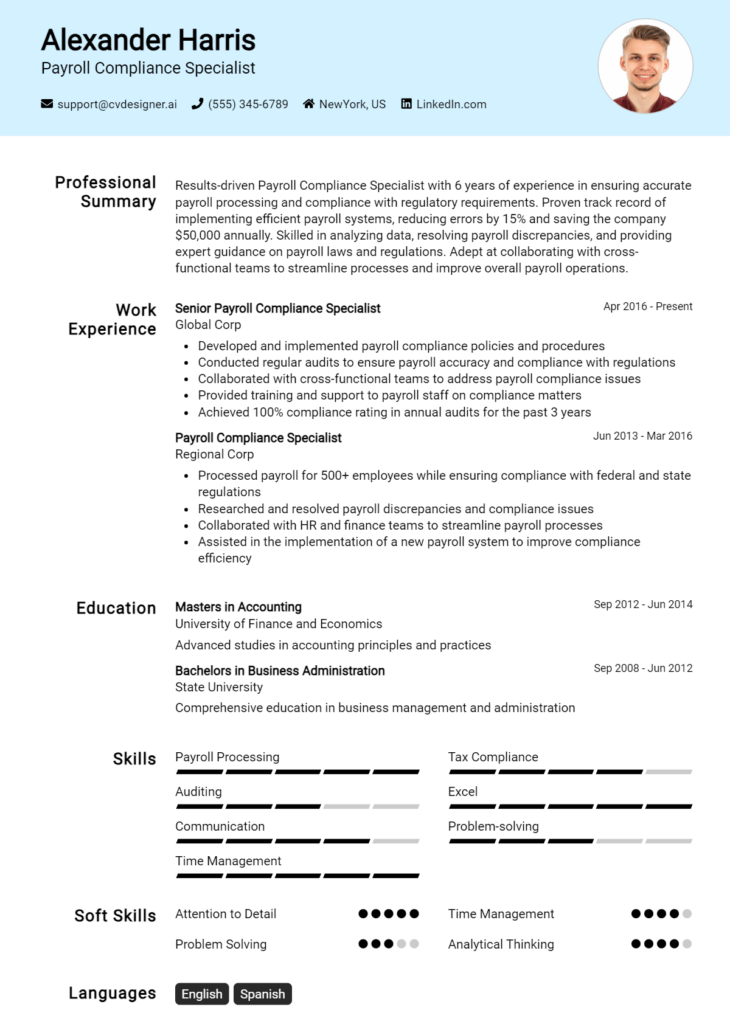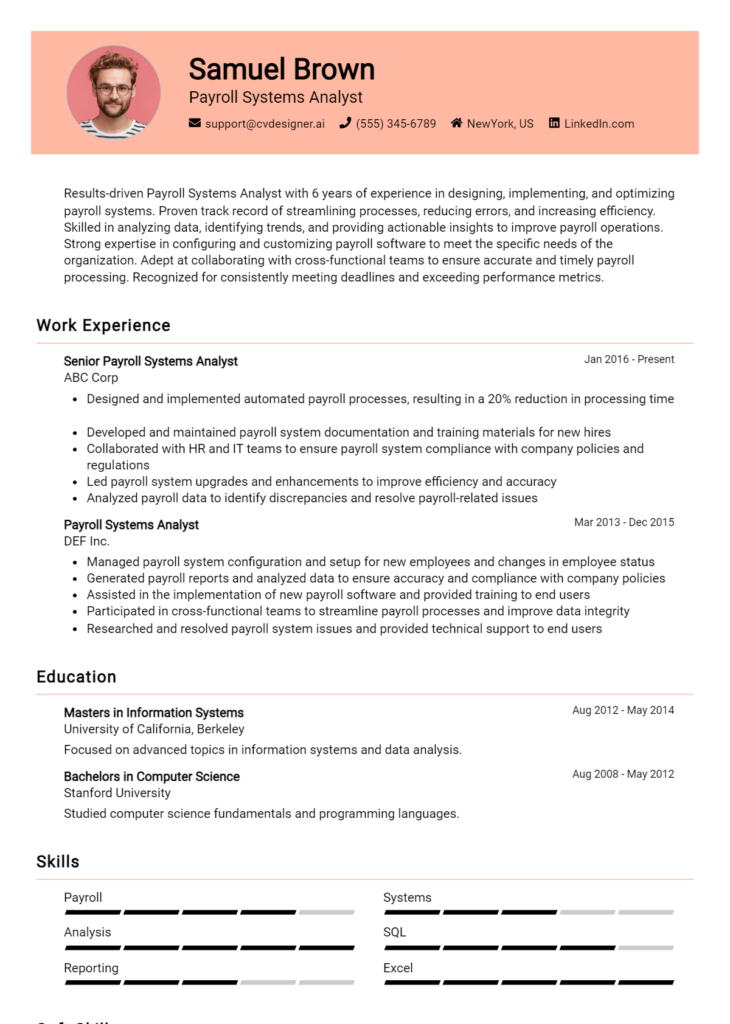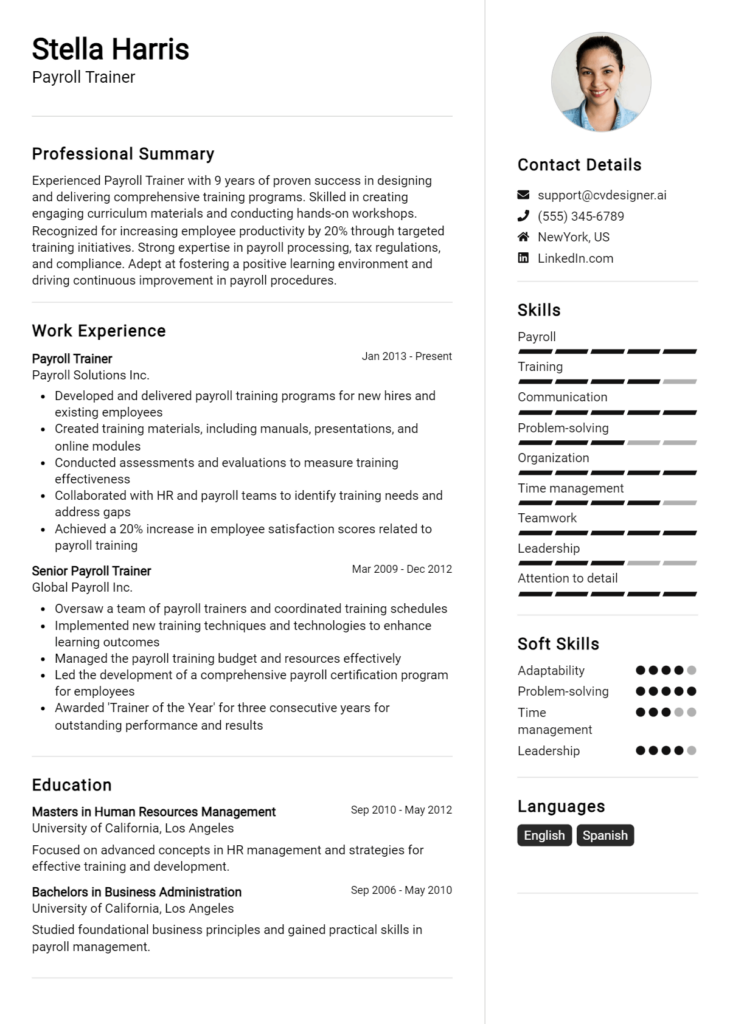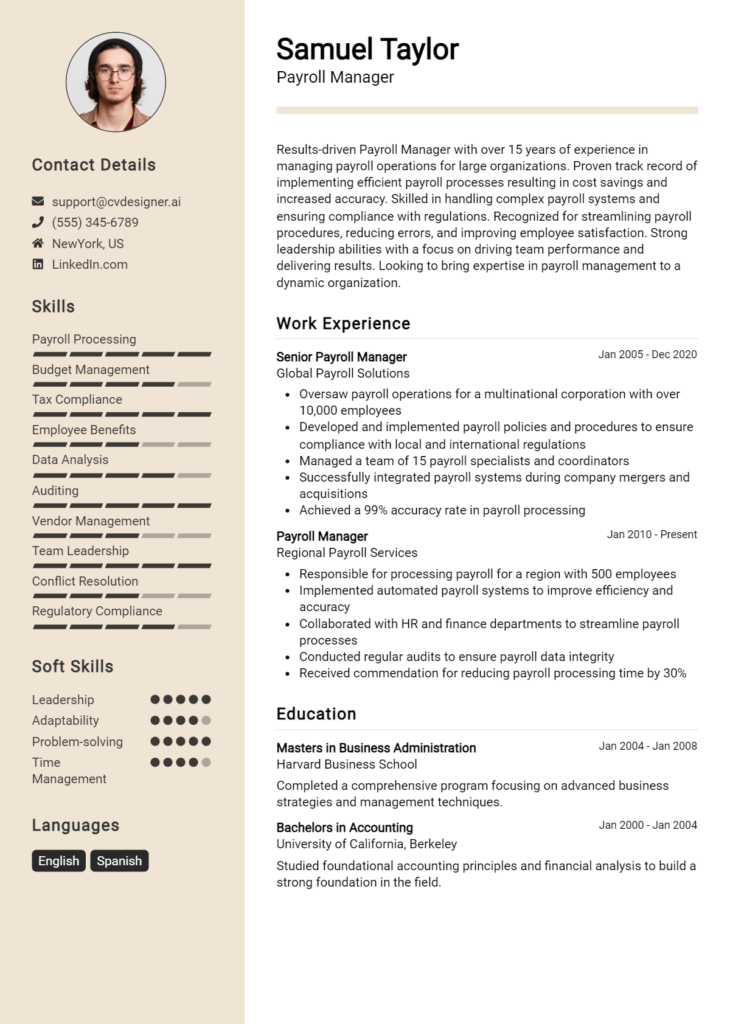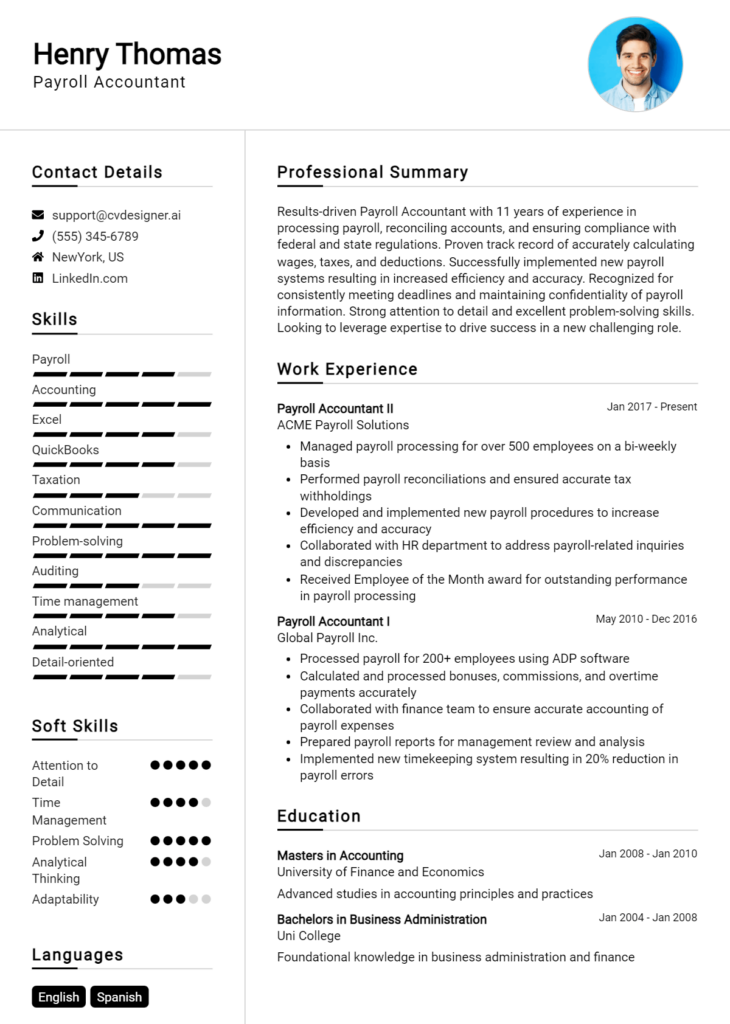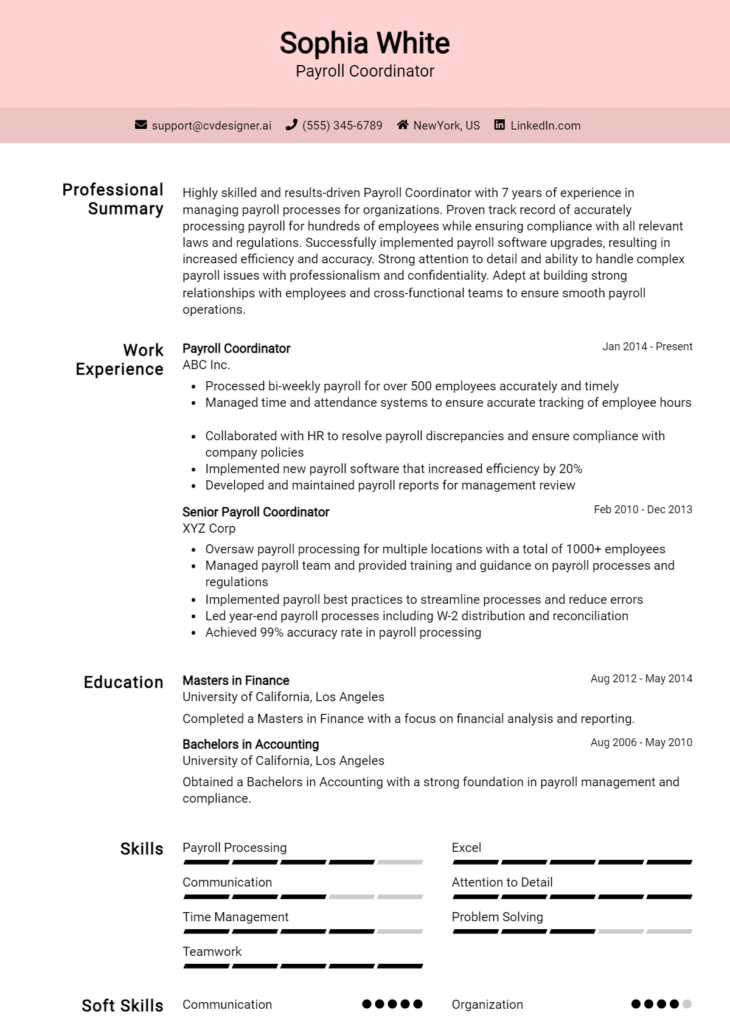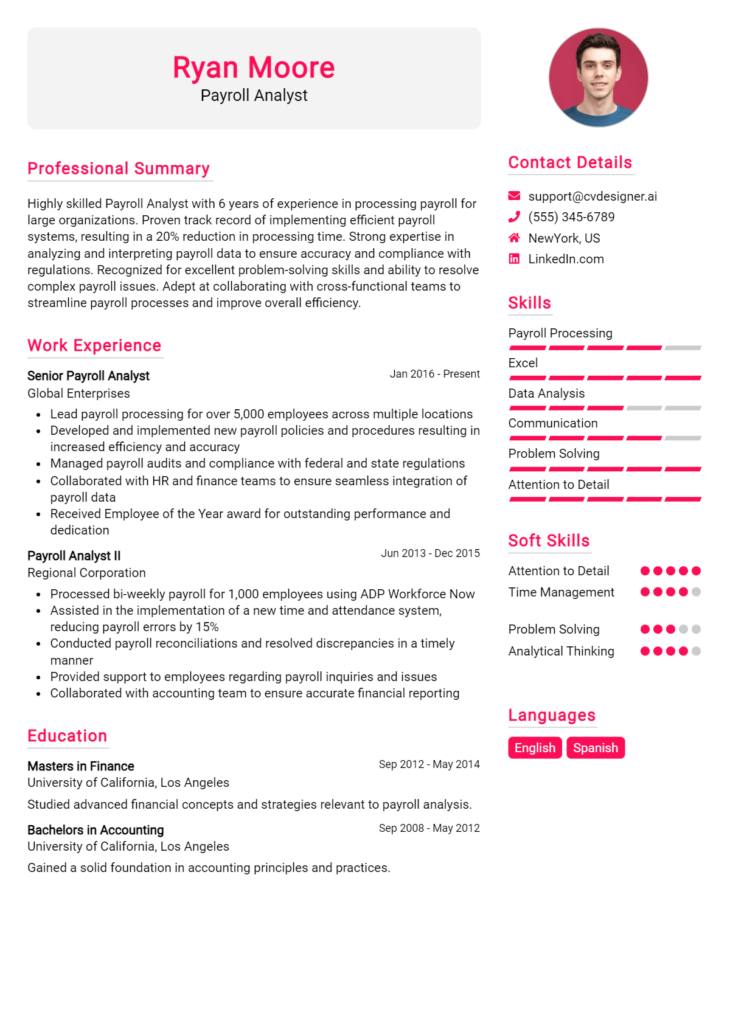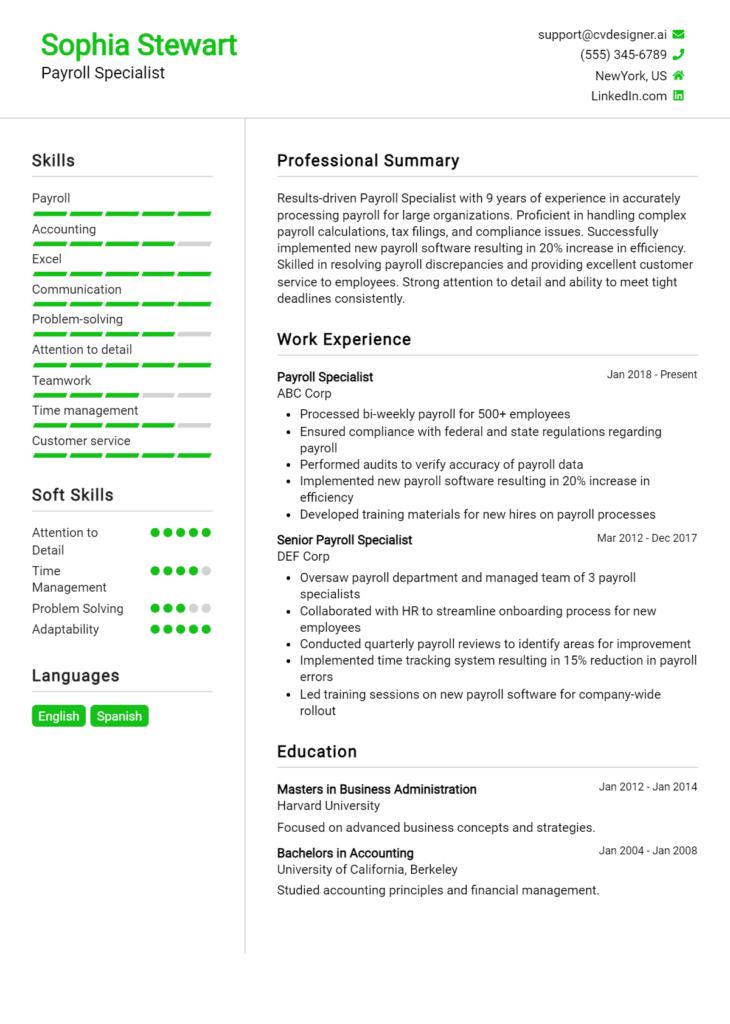Payroll Auditor Core Responsibilities
A Payroll Auditor plays a vital role in ensuring the accuracy and compliance of payroll processes across various departments. Key responsibilities include reviewing payroll records, verifying data integrity, and ensuring adherence to laws and organizational policies. This position demands strong technical skills in payroll software, operational knowledge of financial regulations, and problem-solving abilities to identify discrepancies. These competencies are essential in supporting the organization’s financial health. A well-structured resume effectively highlights these qualifications, demonstrating their importance in achieving the company’s overall goals.
Common Responsibilities Listed on Payroll Auditor Resume
- Conducting regular audits of payroll records and processes.
- Ensuring compliance with federal, state, and local payroll regulations.
- Identifying and resolving payroll discrepancies and errors.
- Collaborating with HR and finance departments to streamline payroll operations.
- Preparing detailed reports on audit findings and recommendations.
- Maintaining accurate documentation of payroll transactions.
- Assisting in the development and implementation of payroll policies.
- Training staff on payroll procedures and compliance requirements.
- Evaluating payroll systems for efficiency and accuracy.
- Providing insights for strategic decision-making related to payroll.
- Performing year-end payroll reconciliations and audits.
- Staying updated on changes in payroll legislation and best practices.
High-Level Resume Tips for Payroll Auditor Professionals
In the competitive field of payroll auditing, a well-crafted resume can be the key to unlocking new career opportunities. As the first impression you make on a potential employer, your resume should effectively showcase your skills, achievements, and expertise in payroll processes, compliance, and audits. A strong resume not only highlights your qualifications but also tells your unique professional story, setting you apart from other candidates. This guide will provide practical and actionable resume tips specifically tailored for Payroll Auditor professionals to help you create a compelling document that resonates with hiring managers.
Top Resume Tips for Payroll Auditor Professionals
- Tailor your resume to align with the specific job description, emphasizing the skills and experiences that match the employer's needs.
- Highlight relevant experience in payroll processing, audit procedures, and compliance regulations to demonstrate your expertise.
- Quantify your achievements by including metrics such as error reduction percentages, cost savings, or the number of audits completed.
- Showcase industry-specific skills, such as proficiency in payroll software, tax regulations, and financial reporting.
- Use action verbs to describe your responsibilities and accomplishments, making your contributions clear and impactful.
- Include relevant certifications, such as Certified Payroll Professional (CPP) or Certified Public Accountant (CPA), to enhance your qualifications.
- Keep the format clean and professional, ensuring easy readability with consistent fonts and clear section headings.
- Incorporate keywords from the job posting to optimize your resume for Applicant Tracking Systems (ATS).
- Highlight teamwork and communication skills, which are essential for collaborating with HR and finance departments.
- Include a brief summary or objective at the top of your resume to quickly convey your career goals and what you bring to the table.
By implementing these tips, you can significantly increase your chances of landing a job in the Payroll Auditor field. A polished and targeted resume will not only showcase your qualifications but also reflect your commitment to the profession, making you a standout candidate in the eyes of potential employers.
Why Resume Headlines & Titles are Important for Payroll Auditor
In the competitive field of payroll auditing, a resume headline or title plays a crucial role in capturing the attention of hiring managers. A strong headline can succinctly encapsulate a candidate's key qualifications, making it easier for recruiters to evaluate their fit for the role at a glance. By using an impactful phrase that directly relates to the job being applied for, candidates can highlight their expertise and stand out from the pool of applicants. A well-crafted headline not only improves the chances of being noticed but also sets the tone for the rest of the resume, inviting the employer to learn more about the candidate's qualifications and suitability for the position.
Best Practices for Crafting Resume Headlines for Payroll Auditor
- Keep it concise: Use clear and straightforward language to convey your expertise in a few words.
- Be role-specific: Tailor the headline to reflect the specific job title you are applying for.
- Highlight key strengths: Focus on your most impressive skills or accomplishments relevant to payroll auditing.
- Use action-oriented language: Incorporate verbs that convey your proactive approach and expertise.
- Include relevant keywords: Integrate industry-specific terms that hiring managers are likely to search for.
- Avoid clichés: Steer clear of overused phrases that may dilute your unique value proposition.
- Create a sense of urgency: Use language that suggests you are a top candidate who can deliver results quickly.
- Reflect your professional brand: Ensure that the headline aligns with your overall career narrative and goals.
Example Resume Headlines for Payroll Auditor
Strong Resume Headlines
Detail-Oriented Payroll Auditor with 5+ Years of Experience in Compliance and Risk Management
Results-Driven Payroll Professional Specializing in Process Improvement and Cost Reduction
Certified Payroll Auditor with Proven Track Record of Streamlining Payroll Operations
Weak Resume Headlines
Payroll Auditor Seeking Job
Experienced Professional
The strong headlines are effective because they clearly articulate specific qualifications and demonstrate how the candidate is uniquely positioned to meet the demands of the payroll auditor role. They utilize relevant keywords and present quantifiable achievements, making a compelling case for the candidate's value. In contrast, the weak headlines fail to impress due to their vagueness and lack of specificity. These generic titles do not provide insight into the candidate's skills or experience, thus diminishing their chances of capturing the attention of hiring managers.
Writing an Exceptional Payroll Auditor Resume Summary
A well-crafted resume summary is crucial for a Payroll Auditor as it serves as the first impression a hiring manager receives. This brief but impactful statement allows candidates to quickly highlight their key skills, relevant experiences, and significant accomplishments that align with the job requirements. A strong summary should be concise, engaging, and tailored to the specific position, ensuring that it captures the attention of hiring managers and sets the tone for the rest of the resume.
Best Practices for Writing a Payroll Auditor Resume Summary
- Quantify Achievements: Use specific numbers to demonstrate your impact, such as reduced payroll errors by a percentage or managed payroll for a certain number of employees.
- Focus on Relevant Skills: Highlight key skills such as attention to detail, analytical abilities, and knowledge of payroll software that are pertinent to the role.
- Tailor the Summary: Customize your summary for each job application by incorporating keywords and phrases from the job description.
- Keep it Concise: Aim for 2-4 sentences that clearly articulate your experience and value without excessive detail.
- Showcase Professional Accomplishments: Mention awards, recognitions, or successful projects that illustrate your proficiency in payroll auditing.
- Use Strong Action Verbs: Start sentences with powerful action verbs to convey confidence and decisiveness.
- Maintain a Professional Tone: Ensure the language used is professional and reflects your expertise in the field.
- Include Industry-Specific Terms: Use terminology that is relevant to payroll auditing to demonstrate your familiarity with the field.
Example Payroll Auditor Resume Summaries
Strong Resume Summaries
Detail-oriented Payroll Auditor with over 5 years of experience in managing payroll for organizations with up to 500 employees. Achieved a 30% reduction in payroll discrepancies through meticulous auditing processes and implementation of automated systems.
Results-driven Payroll Auditor with a track record of improving payroll accuracy by 25% in the last fiscal year. Proficient in leveraging advanced payroll software and compliance regulations to streamline processes and enhance efficiency.
Experienced Payroll Auditor skilled in analyzing payroll data to ensure compliance and accuracy. Successfully led a project that reduced processing time by 15% while maintaining a 98% accuracy rate in payroll audits.
Weak Resume Summaries
I have experience in payroll auditing and I am good at my job. I pay attention to details and work well with numbers.
Dedicated Payroll Auditor looking for a new opportunity to utilize my skills in a challenging environment. I have some experience in the field.
The examples of strong resume summaries effectively highlight specific achievements, quantify results, and use relevant terminology that directly relates to the role of a Payroll Auditor. In contrast, the weak summaries are vague and lack measurable outcomes, making them less impactful and memorable to hiring managers. Strong summaries communicate confidence and capability, while weak ones fail to provide a compelling reason for consideration.
Work Experience Section for Payroll Auditor Resume
The work experience section of a Payroll Auditor resume is pivotal as it serves as a comprehensive showcase of the candidate's technical skills, management capabilities, and commitment to delivering high-quality results. This section not only highlights the applicant's specific experiences in payroll auditing but also emphasizes their ability to adhere to industry standards and regulations. By quantifying achievements and detailing relevant accomplishments, candidates can effectively demonstrate their expertise and the tangible impacts they have made in previous roles, thus making a compelling case to potential employers.
Best Practices for Payroll Auditor Work Experience
- Utilize industry-specific terminology to demonstrate technical expertise.
- Quantify achievements with specific metrics, such as error reduction percentages or time savings.
- Highlight leadership roles or responsibilities in team projects to showcase management skills.
- Focus on collaboration by mentioning cross-departmental projects or teamwork experiences.
- Align experiences with current industry standards and compliance regulations.
- Include relevant software and tools used in payroll auditing to illustrate technical proficiency.
- Describe challenges faced and the solutions implemented to showcase problem-solving abilities.
- Tailor the work experience to align with the specific job description of the position being applied for.
Example Work Experiences for Payroll Auditor
Strong Experiences
- Led a team of 5 auditors in a comprehensive payroll review that resulted in a 30% decrease in discrepancies, enhancing accuracy and compliance.
- Implemented a new payroll software system that streamlined processes, reducing payroll processing time from 10 days to 5 days.
- Collaborated with HR and finance departments to develop a training program that improved payroll accuracy by 25% over six months.
- Conducted audits on over 1,000 employee payroll records, identifying and correcting errors that saved the company $50,000 annually.
Weak Experiences
- Worked on payroll audits with little detail on the scope or results of the work done.
- Assisted team members with various tasks without specifying contributions or outcomes.
- Participated in meetings regarding payroll processes without detailing any actionable results.
- Maintained payroll records without any mention of improvements or efficiencies achieved.
The examples listed as strong experiences demonstrate clear, quantifiable outcomes, leadership in managing teams, and effective collaboration across departments, showcasing a candidate's significant contributions to previous employers. In contrast, the weak experiences lack specific details, measurable achievements, and impactful responsibilities, making them less compelling and failing to illustrate the candidate's potential value to prospective employers.
Education and Certifications Section for Payroll Auditor Resume
The education and certifications section of a Payroll Auditor resume is crucial as it showcases the candidate's academic background, industry-relevant certifications, and commitment to continuous learning. This section not only provides potential employers with insights into the candidate's qualifications but also reflects their dedication to staying current with industry standards and practices. By including relevant coursework, certifications, and specialized training, candidates can significantly enhance their credibility and demonstrate their alignment with the requirements of the Payroll Auditor role.
Best Practices for Payroll Auditor Education and Certifications
- Prioritize relevant degrees such as Accounting, Finance, or Business Administration.
- Include industry-recognized certifications like Certified Payroll Professional (CPP) or Payroll Compliance Practitioner (PCP).
- Detail relevant coursework that aligns with payroll management, auditing, and compliance.
- Highlight any specialized training in payroll software or systems used in the industry.
- Ensure the information is up-to-date, reflecting the latest qualifications and certifications.
- Consider including ongoing education efforts, such as workshops or seminars attended.
- Be concise but thorough in listing credentials to maintain clarity and readability.
- Tailor the education and certifications section to match the specific job description and requirements.
Example Education and Certifications for Payroll Auditor
Strong Examples
- Bachelor of Science in Accounting, University of XYZ, 2020
- Certified Payroll Professional (CPP), American Payroll Association, 2021
- Advanced Payroll Management Course, ABC Training Institute, 2022
- Coursework in Taxation and Compliance, University of XYZ, 2019
Weak Examples
- General Studies, Community College, 2018
- Certificate in Basic Computer Skills, Online Learning Platform, 2020
- High School Diploma, Anytown High School, 2016
- Outdated certification in QuickBooks, 2015
The strong examples listed reflect relevant degrees and certifications that align directly with the responsibilities and skills required for a Payroll Auditor position, demonstrating the candidate's preparedness for the role. In contrast, the weak examples include qualifications that are either too general, outdated, or unrelated to the specific demands of payroll auditing. Such entries could detract from a candidate's appeal to prospective employers and fail to demonstrate their suitability for the job.
Top Skills & Keywords for Payroll Auditor Resume
In the competitive landscape of payroll auditing, having a well-crafted resume that highlights relevant skills is crucial for standing out to potential employers. Employers seek candidates who not only possess technical knowledge but also demonstrate a strong set of interpersonal abilities. A Payroll Auditor's resume should effectively showcase a blend of hard and soft skills that reflect both the analytical and communicative aspects of the role. This combination ensures that candidates can navigate complex payroll systems while also collaborating effectively with teams and stakeholders. By emphasizing these skills, applicants can present themselves as well-rounded professionals ready to contribute to the efficiency and accuracy of payroll operations.
Top Hard & Soft Skills for Payroll Auditor
Soft Skills
- Attention to Detail
- Analytical Thinking
- Problem Solving
- Communication Skills
- Time Management
- Team Collaboration
- Adaptability
- Ethical Judgment
- Organizational Skills
- Customer Service Orientation
Hard Skills
- Payroll Processing Software Proficiency
- Understanding of Tax Regulations
- Data Analysis and Reporting
- Financial Reconciliation
- Knowledge of Labor Laws
- Proficient in Excel and Spreadsheet Management
- Familiarity with Accounting Principles
- Audit Procedures and Compliance
- Database Management
- Accuracy in Data Entry
By mastering these skills, candidates can significantly improve their chances of landing a role as a Payroll Auditor. Additionally, highlighting relevant work experience is essential to complement these skills and demonstrate real-world application in the field.
Stand Out with a Winning Payroll Auditor Cover Letter
Dear Hiring Manager,
I am writing to express my interest in the Payroll Auditor position at [Company Name], as advertised on [where you found the job listing]. With a strong background in payroll processing and auditing, I am confident in my ability to contribute positively to your finance team. My experience in ensuring compliance with federal and state regulations, coupled with my meticulous attention to detail, positions me as an ideal candidate for this role.
In my previous role at [Previous Company Name], I successfully led payroll audits that resulted in a 15% reduction in discrepancies over a one-year period. My responsibilities included reviewing payroll reports, conducting thorough audits of payroll transactions, and collaborating with HR to rectify any identified issues. I pride myself on my analytical skills and my ability to communicate complex financial information clearly to non-financial stakeholders. This has proven invaluable in fostering a culture of transparency and accuracy within the organization.
I am particularly drawn to the Payroll Auditor position at [Company Name] because of your commitment to excellence and innovation in financial management. I am eager to contribute my expertise in payroll auditing and compliance to help streamline processes and enhance the accuracy of payroll operations. I am excited about the opportunity to work with a dedicated team and to bring my proactive approach to problem-solving to your organization.
Thank you for considering my application. I look forward to the possibility of discussing how my experience and skills align with the needs of your team. I am enthusiastic about the prospect of contributing to [Company Name] and am available for an interview at your earliest convenience.
Sincerely,
[Your Name]
[Your Phone Number]
[Your Email Address]
Common Mistakes to Avoid in a Payroll Auditor Resume
When crafting a resume for a Payroll Auditor position, it's crucial to ensure that your document effectively showcases your skills, experience, and qualifications. However, many candidates make common mistakes that can hinder their chances of landing an interview. By avoiding these pitfalls, you can create a more compelling resume that highlights your expertise in payroll compliance, data analysis, and financial reporting. Here are some common mistakes to watch out for:
Lack of Specificity: Using vague language can make your contributions seem less impactful. Instead of saying "responsible for payroll," specify "managed payroll processing for over 500 employees."
Ignoring Relevant Keywords: Many employers use applicant tracking systems (ATS) to screen resumes. Failing to include relevant industry keywords can result in your resume being overlooked.
Overly General Job Descriptions: Providing generic job descriptions without quantifiable achievements can diminish your resume's effectiveness. Focus on specific accomplishments, like reducing payroll discrepancies by 20%.
Neglecting Formatting: A cluttered or inconsistent format can make your resume difficult to read. Use clear headings, bullet points, and consistent font styles to enhance readability.
Omitting Certifications: Failing to mention relevant certifications, such as Certified Payroll Professional (CPP), can weaken your resume. Highlight any credentials that demonstrate your expertise in payroll auditing.
Too Much Personal Information: Including excessive personal details, such as age or marital status, can be seen as unprofessional and may expose you to bias. Stick to information relevant to the job.
Not Tailoring the Resume: Sending out a one-size-fits-all resume can be detrimental. Tailor your resume for each application by emphasizing the skills and experiences that align with the specific job description.
Neglecting Soft Skills: While technical skills are crucial, overlooking soft skills such as attention to detail and communication can be a mistake. Employers value candidates who can collaborate effectively and communicate complex information clearly.
Conclusion
As a Payroll Auditor, you play a crucial role in ensuring the accuracy and compliance of payroll processes within an organization. Throughout this article, we've highlighted the key responsibilities of a Payroll Auditor, including reviewing payroll records, ensuring adherence to regulations, and identifying discrepancies. Additionally, we discussed the essential skills required for success in this role, such as analytical thinking, attention to detail, and knowledge of payroll systems.
In conclusion, if you're looking to advance your career as a Payroll Auditor, it's essential to have a polished and effective resume that showcases your skills and experience. We encourage you to take a moment to review your Payroll Auditor Resume and ensure it aligns with industry standards. To assist you in this process, we offer a variety of tools that can help you create a standout application. Explore our resume templates, utilize our resume builder, reference resume examples, and don't forget to craft an impressive cover letter using our cover letter templates.
By leveraging these resources, you can enhance your chances of landing your desired Payroll Auditor position. Take action today and start building a resume that truly reflects your qualifications and sets you apart from the competition!

